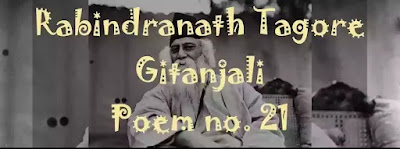Also Read
I must launch out my boat. The languid hours pass by on the shore - Alas for me!
The spring has done its flowering and taken leave. And now with the burden of faded futile flowers I wait and linger.
The waves have become clamorous, and upon the bank in the shady lane the yellow leaves flutter and fall.
What emptiness do you gaze upon!
Do you not feel a thrill passing through the air with the notes of the far away song floating from the other shore?
Summary
This lyric talks about the poet's quest for his union with God and is therefore waiting for death. Tagore says he must start his voyage soon. He is passing lazy hours on the shore and he feels sorry. He regrets that he cannot start on his voyage immediately. The poet then says that spring has come, flowered and gone. The poet's youth has gone. And as a man burdened with wilted flowers that cannot be offered in prayer he waits with his old useless body and he lives on uselessly though he is moving towards death and then a union with God. The waves are making insistent noises calling out to him, and the yellow autumnal leaves are falling to the ground. Then the poet berates himself for gazing upon an emptiness and remaining idle and ask himself if he doesn't feel the thrill of the song calling him from the other shore.
Critical Analysis
In this poem Tagore again uses imagery that are distinctly taken from Hindu mythology in order to present a vivid picture of man or himself waiting to go to God's presence. He has been waiting for this union for a long time, on the shore, waiting to launch his boat. The use of the words shore, boat etc instantly bring to mind the Hindu mythological concept of the soul alter death having to cross the sea of eternity to reach God. Again, the flower imagery makes its appearance. He compares himself to a flower who having flowered in spring is now faded and wilted can no longer be used in worship. He is also old and about to die and face God, he is lingering, he has not yet started his voyage yet. He knows that Death and divine, union is near from the 'waves clamouring' the waves rising and making insistent noises is apt because one can launch one's boat only when the waves are high. And Tagore uses the image of yellow leaves falling down to indicate the autumn of his life. The waves are calling him. And he tries to persuade himself, tells himself to launch his boat and embark on his journey soon, by telling him that he is all along looking at nothing and asking him if he doesn't feel a thrill of joy upon hearing the song calling him from the distant other shore. Thus in this lyric Tagore eloquently expresses his longing for union with God passing through the sea of eternity.
"I must launch out my boat. The languid hour pass by on the shore - Alas for me! The spring has done its flowering and taken leave. And now with the burden faded futile flower I wait and linger."
The beautiful image of boat suggests the spiritual voyage of poet. The man, busy within the life looses his time and forgets about the divine presence. Now the poet is aware of that inscrutable will and he does not want to lose this glorious moment. He wishes to start his spiritual voyage to the sea of eternity. He has lost his time on the shore of endless world. The spring has come and gone. The flowers are faded and now remain useless in hands like a burden.
Annotation
Lauch out my boat: starting on a journey, here the journey is towards God after death. Languid hours: slack and listness, lazy hours. Burden of faded futile flowers: the burden of flowers now useless as they can't be used in worship or the poet now old and unable to worship. Linger: the poet's life moving towards death but still alive. Clamorous: noisy, insistent sound. Do you not... other shore: the joy felt upon hearing God's summons into his presence from his realm.
